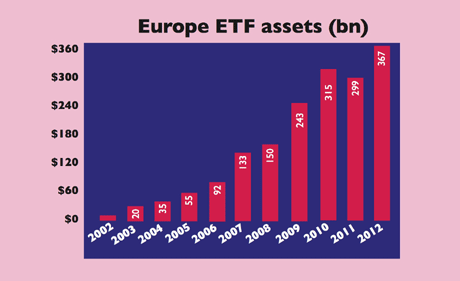The deserved popularity of ETFs
European exchange-traded funds are back in favour despite the crisis in the eurozone. But as always, watch out for costs, says Paul Amery.

Get the latest financial news, insights and expert analysis from our award-winning MoneyWeek team, to help you understand what really matters when it comes to your finances.
You are now subscribed
Your newsletter sign-up was successful
Want to add more newsletters?

Twice daily
MoneyWeek
Get the latest financial news, insights and expert analysis from our award-winning MoneyWeek team, to help you understand what really matters when it comes to your finances.

Four times a week
Look After My Bills
Sign up to our free money-saving newsletter, filled with the latest news and expert advice to help you find the best tips and deals for managing your bills. Start saving today!
After a year dominated by the eurozone crisis, 2012 saw a return to popularity for Europe's exchange-traded fund (ETF) market. The amount of money invested in ETFs and related products hit a new high of $367bn, up 23% on 2011.
Worldwide, assets are approaching a new high-water mark of $2trn, with the US driving growth. Vanguard, the US-based fund manager that's renowned for its index funds, took in an industry record of $141bn of new cash last year.
There's one simple reason why ETFs are outselling traditional, actively-managed funds (European index-tracking equity ETFs took in $14bn for 2012, while active funds saw investors withdraw almost the same amount) cost.
MoneyWeek
Subscribe to MoneyWeek today and get your first six magazine issues absolutely FREE

Sign up to Money Morning
Don't miss the latest investment and personal finances news, market analysis, plus money-saving tips with our free twice-daily newsletter
Don't miss the latest investment and personal finances news, market analysis, plus money-saving tips with our free twice-daily newsletter
Most developed-country equity markets have delivered near-zero or even negative capital returns since 2000. And despite recent rallies, the FTSE 100 index is still much lower than it was when we were all worrying about the Y2K software bug at the start of the noughties.

As a result, investors' returns over the last decade have come largely from dividend payments. The fees charged by fund managers have eaten into that crucial income stream. With the average actively-managed fund charging 1.5%-1.75% a year while a typical ETF charges 0.2%-0.3%, it's little wonder so many investors now choose to go passive.
The Retail Distribution Review (RDR) which banned commission being paid to advisers on most financial products has also highlighted that too much of our savings have been lost to intermediaries in the past. ETFs which have never paid commissions are benefiting.
The industry faces growing pains, as you'd expect. Critics caution that flows into index-tracking ETFs may be distorting the markets by artificially shifting the prices of shares or bonds contained in a particular index at the expense of those that don't.
This index effect' may be strongest in bond markets bond ETFs saw record inflows in 2012, particularly to riskier high-yield funds. So always pay close attention to the index your fund tracks. Is the index overowned'?
Some high-yield ETFs now generate a third of all daily trading in the junk-bond market, a segment that's notoriously illiquid in bad times. Meanwhile, if everyone buys, say, the same emerging-market equity ETF, valuation distortions are likely to follow. But overall, we believe ETFs should typically be your first port of call when investigating ways to play a sector or index just keep an eye on costs.
Paul Amery edits www.indexuniverse.eu, the top source of news and analyses on Europe's ETF and index-fund market.
Get the latest financial news, insights and expert analysis from our award-winning MoneyWeek team, to help you understand what really matters when it comes to your finances.
Paul is a multi-award-winning journalist, currently an editor at New Money Review. He has contributed an array of money titles such as MoneyWeek, Financial Times, Financial News, The Times, Investment and Thomson Reuters. Paul is certified in investment management by CFA UK and he can speak more than five languages including English, French, Russian and Ukrainian. On MoneyWeek, Paul writes about funds such as ETFs and the stock market.
-
 Should you buy an active ETF?
Should you buy an active ETF?ETFs are often mischaracterised as passive products, but they can be a convenient way to add active management to your portfolio
-
 Power up your pension before 5 April – easy ways to save before the tax year end
Power up your pension before 5 April – easy ways to save before the tax year endWith the end of the tax year looming, pension savers currently have a window to review and maximise what’s going into their retirement funds – we look at how
